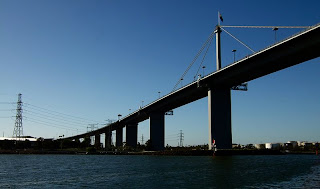A few years ago, something horrific happened in Melbourne
It’s the sort of thing that has happened before, and happened since and will no doubt happen again: An angry parent, cheesed off over a child custody issue, deliberately killing a child to punish the other parent.
The particular case I’m talking about here is the case of Darcey Freeman. A bubbly four year old girl, she was driven by her father up on to the Westgate Bridge
Now, Darcey’smum is suing Vic Roads because they ignored repeated advice to install safety barriers.
There is some pain that can’t be measured. I couldn’t begin to understand what it is like for any parent to lose a child, let alone lose a child to such a callous act. But this attempt to sue the Government, like many similar claims, points to a much wider, more troublesome pattern in Australia
Let’s be fair, there is compensation – along with counselling and support services – available for Victims of Crime. The maximum in Victoria
This is a pretty paltry, almost token payment in many cases. No amount will be enough to bring Darcey back, or to console Darcey’s mum. In many instances it won’t even cover ongoing expenses that result from crime. But it’s a good, and reasonable system.
Darcey’s father broke the law. He has been punished for breaking the law and with a bit of luck he will rot in jail for 32 years. It’s an unusually good sentencing result we don’t always see. Many of us have doubts about the sentencing system, but that is a completely separate issue from civil suits of the sort Darcey’s mum is now pursuing.
Claims for compensation under common [as opposed to statute] law are expensive to launch, and place claimants at great financial risk if they fail. While the amount of damages is decided by juries in the United States , in Australia Australia
The key word in civil cases is “reasonable”.
Could a reasonable person have foreseen that someone was at risk if, for example, Vic Roads did not provide safety barriers?
What would a reasonable person expect is a reasonable amount of care for a person or organisation to take? Is it reasonable to expect that a bridge should have safety barriers to prevent suicides or murderers from harming themselves? If so, then every bridge – and every building of any great height – should have safety barriers as a matter of course.
This common law idea of a duty of care has been included in a lot of statute law. The WorkCover acts in each state, for example, allow the law to enforce a reasonable amount of care, saving victims from the expense and uncertainty of having to go to court themselves for compensation. Hopefully, the risk of being sued or fined does prevent a lot of accidents in the workplace.
The question of what is reasonable is a sticky one.
Recently, the Premier of Victoria Ted Baillieu mentioned that there is a fine of $6,000for leaving a wading pool – 30 cm or more deep – unfenced. What is the fine for putting water in a bathtub that’s not fenced? What about the walkways and roadways around lakes, or across dams? What about a day at the beach? Where should we draw the line in the sand – legally speaking?
Are more children hurt by rogue dogs each year than drown in wading pools? If not by strange dogs, by family pets?
When the giant gum in our backyard lost yet another large limb during the drought, we looked at the 150 foot high trunk leaning over the shed next door. We actually like these neighbours. A reasonable person might see there was some risk to these people if we didn't act. The tree was literally rotten to the core.
Is it reasonable that the law required us to get a permit to chop down a tree? Is it reasonable to leave the danger there until we could get a permit? Is it reasonable that we should have to pay for a permit? [It cost $800 to remove the thing anyway].
When a neighbour heard the chainsaws and came charging up the street to ask if we had chopped a tree down, was I immoral to say "No, it fell"?
I’m glad there are now barriers on the Westgate Bridge
My heart goes out to all the mums and dads of all the Darceys.
Nothing can prevent bad people from harming others, and certainly not from harming vulnerable children. If an adult wants to harm a child, or if a teen or adult wants to commit suicide, they will find a way.
The problem, in every case, is not that accidents happen or that people are sometimes evil, but that people are mostly just human. It only takes seconds for a young child to get into trouble.
At what point do we stop passing laws and ask people to start being more careful? To start taking responsibility for themselves instead of asking governments to wrap themselves or their children in cottonwool?












